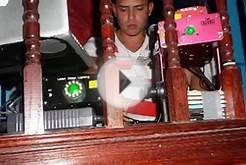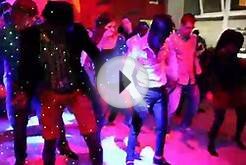 Pretty much everything is for sale along Roosevelt Avenue, a bustling strip in Queens, New York. For the right price, you can get everything from Colombian pastries to forged working papers. And for two dollars, you can even buy a dance.
Pretty much everything is for sale along Roosevelt Avenue, a bustling strip in Queens, New York. For the right price, you can get everything from Colombian pastries to forged working papers. And for two dollars, you can even buy a dance.
There are somewhere around 50 so-called “bailarina bars” located on Roosevelt Ave. They are bars where men can go and dance with women to Latin rhythms such as salsa or bachata at the cost of two dollars a song. For 15 dollars, one of the women will share a beer with you for a few minutes. For 40 dollars, she’ll sit at your table for an hour and hang out with you. In the last fifteen years or so, the bars have boomed in popularity, popping up in immigrant neighborhoods all over the Northeast and beyond.
FAR FROM HOME
At El Gato Verde, there are colored lights, smoke machines and plentiful buckets of beer. About forty women in tight-fitting clothing stand around, waiting to be asked to the dancefloor. In the center, couples twirl to popular songs. Although it’s rumored that some of the girls will go farther for the right price outside of the club, most patrons come here just for a little bit of innocent companionship.
“Dancing de-stresses me, ” says Juan Hernandez, a 23-year old immigrant in attendance at the club. Hernandez works ten to twelve hours a day, six days a week at a Japanese restaurant in Manhattan. He says he goes to the bars twice a month, after he sends money home to his family in Mexico. “It makes me forget about work for a little while. Even though it costs money.” Hernandez is typical of the men who frequent the bailarina bars. “My clients are guys who are really lonely, who have a lot of problems, many come from rural areas, ” says Diana Trejos, a dancer who has been working in clubs on Roosevelt for 13 years.
 “Many of them left families behind back home. They’re whole life is about working to help them. And after long days working in kitchens or at construction sites, to have to go back to a little room with no company except for a television, it’s too much for them, ” she says. Trejos thinks the entire two-dollar dance industry is a response to immigration. She herself came to the US to support young children she left in Colombia. She waitressed at first, but was having trouble making ends meet. When a friend told her about the “bailarina clubs, ” she decided to give it a try.
“Many of them left families behind back home. They’re whole life is about working to help them. And after long days working in kitchens or at construction sites, to have to go back to a little room with no company except for a television, it’s too much for them, ” she says. Trejos thinks the entire two-dollar dance industry is a response to immigration. She herself came to the US to support young children she left in Colombia. She waitressed at first, but was having trouble making ends meet. When a friend told her about the “bailarina clubs, ” she decided to give it a try.
“I thought it was very strange at first. But the money was really good, ” she says. Trejos says the pay has gotten worse over the years, but she used to be able to make between 0 and 0, better than the minimum-wage jobs available to her.
Although the money is good, conditions for the dancers aren’t always ideal in such an unregulated business. In 2008, Trejos was part of a suit against the Flamingo club, where she worked for several years. Among other charges, she and the other plaintiffs alleged that the owner charged them fees to work, verbally abused them, fined them excessively for lateness and forced them to purchase expensive costumes for “theme” nights. The dancers ultimately won a settlement with the owner.
LETTING THEM DOWN EASY
For the most part, however, Trejos says the greatest workplace hazard is when her clients fall in love with her, and she had to figure out how to let them down lightly. “I am always honest from the beginning, and tell them I’m taken. Some of the women lie and tell the men that they are single and lead them on so they’ll spend more money on dancing with them, ” she says.
Shaun Leonardo, an artist from Queens, thinks the men are aware of what they are getting into when they hand over their two dollars. In 2013, he threw a conceptual “performance party” titled “The Tiki, Tiki Club” inspired by the bailarina bars, in which the roles of the men and women were reversed: instead of the men paying the women, the women would pay the men to dance. He was one of the dancers-for-hire, and had some revelations about what that means. He says that the client is paying for a fantasy.
“The two dollars are a social contract. Our role wasn’t to be ourselves, per se, our role was to fulfill whatever they wanted for those two dollars for that one son, ” he says. “The situation allows for someone to believe for a few minutes in whatever kind of relationship they want.









